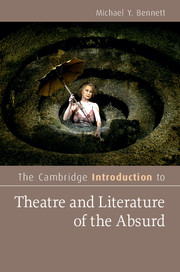Book contents
- Frontmatter
- Dedication
- Contents
- Acknowledgments
- Chapter 1 Introduction: Overview of the absurd
- Chapter 2 Setting the stage
- Chapter 3 The emergence of a “movement”: The historical and intellectual contexts
- Chapter 4 Samuel Beckett
- Chapter 5 Beckett's notable contemporaries
- Chapter 6 The European and American wave of absurdism
- Chapter 7 Post-absurdism?
- Chapter 8 Absurd criticism
- Notes
- Further reading
- Index
- Cambridge Introductions to …
Chapter 8 - Absurd criticism
Published online by Cambridge University Press: 05 November 2015
- Frontmatter
- Dedication
- Contents
- Acknowledgments
- Chapter 1 Introduction: Overview of the absurd
- Chapter 2 Setting the stage
- Chapter 3 The emergence of a “movement”: The historical and intellectual contexts
- Chapter 4 Samuel Beckett
- Chapter 5 Beckett's notable contemporaries
- Chapter 6 The European and American wave of absurdism
- Chapter 7 Post-absurdism?
- Chapter 8 Absurd criticism
- Notes
- Further reading
- Index
- Cambridge Introductions to …
Summary
The scholarship surrounding the major writers traditionally affiliated with the theatrical absurd (e.g., Beckett, Ionesco, Genet, Pinter, and Albee) has generally worked under, or alongside, the rubric of absurdism. These playwrights’ not-self-proclaimed affiliation with the “absurd” came about, and, in part, in response to, with Martin Esslin's 1961 book, The Theatre of the Absurd, following his article by the same name in 1960. Using Camus’ philosophy of the absurd, Esslin argues that the plays of the Theatre of the Absurd investigate the “metaphysical anguish” of the human condition and the purported purposelessness of life. Yet Esslin was not the first scholar to characterize the poster child of absurdism, Beckett, and his work as “absurd.” In what appears to be the very first academic article on Beckett, Edith Kern, in 1954, described Waiting for Godot as portraying, “the absurdly comical situation” of “man's place in the universe.” The philosophical world of Beckett, as argued by Kern, stands in stark contrast to that imagined by Esslin. Esslin's Beckett imagines the world without a God and – in many ways stemming from this – ultimately, without purpose. Kern's Beckett sees human tenderness as that which not only gives humans meaning, strength, and the will to go on, but as something that which, itself, replaces the God-like redeemer: “Beckett's characters in [Waiting for Godot] glorify rather the all-surpassing power of human tenderness which alone makes bearable man's long and ultimately futile wait for a redeemer and which, in fact, turns out itself to be the redeemer of man in his forlornness.”
Esslin states that “By 1942 Albert Camus was calmly putting the question why, since life had lost all meaning, should man not seek escape in suicide?” This leads Esslin (and the field) to a very bleak reading of Beckett's work. However, Camus’ entire book, The Myth of Sisyphus, was explicitly about why one should not commit suicide because we can make meaning for ourselves only through our act of defiance against our absurd situation.
- Type
- Chapter
- Information
- Publisher: Cambridge University PressPrint publication year: 2015



